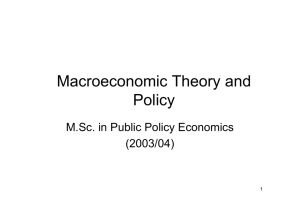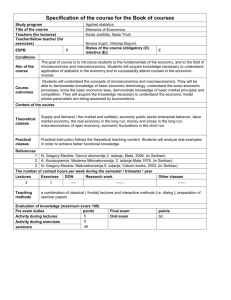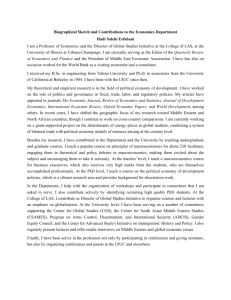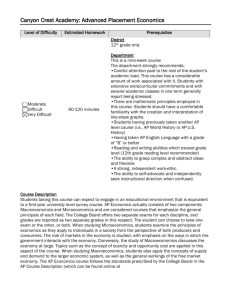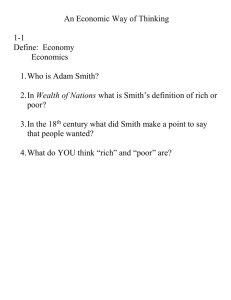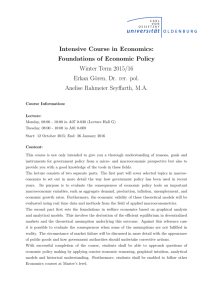Macroeconomics Theory II (EC 830)
advertisement
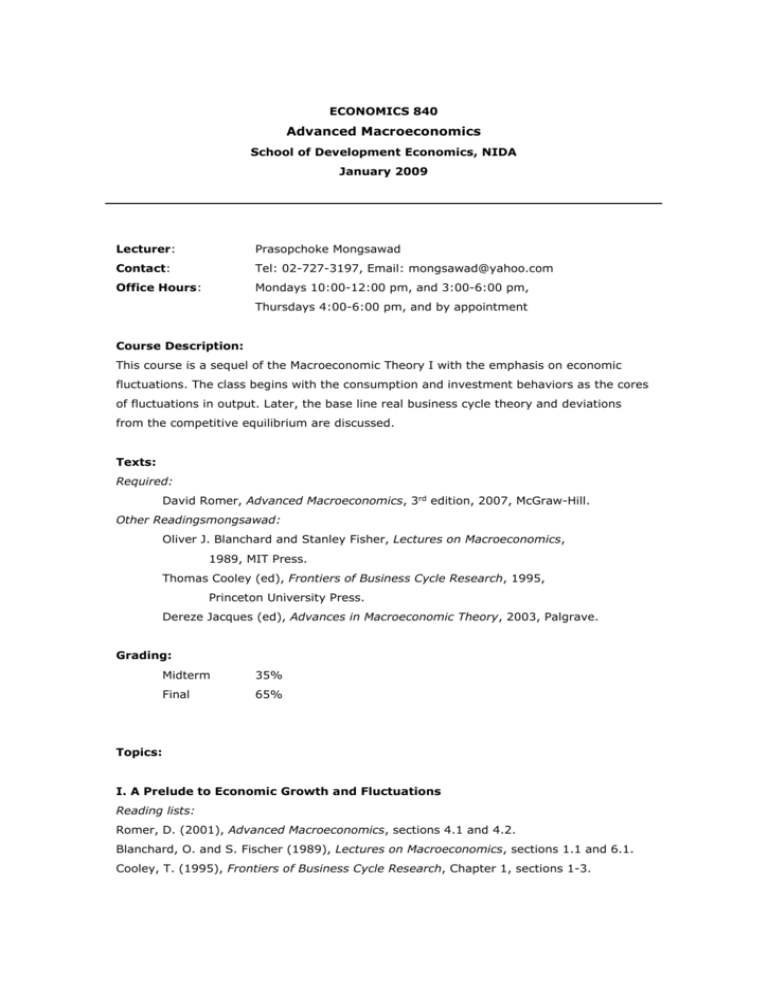
ECONOMICS 840 Advanced Macroeconomics School of Development Economics, NIDA January 2009 Lecturer: Prasopchoke Mongsawad Contact: Tel: 02-727-3197, Email: mongsawad@yahoo.com Office Hours: Mondays 10:00-12:00 pm, and 3:00-6:00 pm, Thursdays 4:00-6:00 pm, and by appointment Course Description: This course is a sequel of the Macroeconomic Theory I with the emphasis on economic fluctuations. The class begins with the consumption and investment behaviors as the cores of fluctuations in output. Later, the base line real business cycle theory and deviations from the competitive equilibrium are discussed. Texts: Required: David Romer, Advanced Macroeconomics, 3rd edition, 2007, McGraw-Hill. Other Readingsmongsawad: Oliver J. Blanchard and Stanley Fisher, Lectures on Macroeconomics, 1989, MIT Press. Thomas Cooley (ed), Frontiers of Business Cycle Research, 1995, Princeton University Press. Dereze Jacques (ed), Advances in Macroeconomic Theory, 2003, Palgrave. Grading: Midterm 35% Final 65% Topics: I. A Prelude to Economic Growth and Fluctuations Reading lists: Romer, D. (2001), Advanced Macroeconomics, sections 4.1 and 4.2. Blanchard, O. and S. Fischer (1989), Lectures on Macroeconomics, sections 1.1 and 6.1. Cooley, T. (1995), Frontiers of Business Cycle Research, Chapter 1, sections 1-3. -2II. Consumption Theories Reading lists: Romer, D. (2001), Advanced Macroeconomics, Chapter 7. Campbell, J. and G. Mankiw (1989), “Consumption, Income, and Interest Rates: Reinterpreting the Time Series Evidence,” NBER Macroeconomics Annual 6, pp. 319-333. Mankiw, G. (1982), “Hall’s Consumption Hypothesis and Durable Goods,” Journal of Monetary Economics 10, pp. 417-425. Blanchard, O. and S. Fischer (1989), Lectures on Macroeconomics, section 6.2. III. Investment Theories Reading lists: Romer, D. (2001), Advanced Macroeconomics, Chapter 8. Caballero, R. (1991), “On the Sign of the Investment-Uncertainty Relationship,” American Economic Review 81, pp. 279-288. Blanchard, O. and S. Fischer (1989), Lectures on Macroeconomics, section 6.3. IV. Real Business Cycle Theory Reading lists: Romer, D. (2001), Advanced Macroeconomics, Chapter 4. Cooley, T. (1995), Frontiers of Business Cycle Research, Chapter 1. Prescott, E. (1986), “Theory Ahead of Business Cycle Measurement,” Federal Reserve Bank of Minneapolis Quarterly Review, pp. 9-22. Sims, C. (1996), “Macroeconomics and Methodology,” Journal of Economics Perspectives 10, pp. 105-120. Plosser, C. (1989), “Understanding Real Business Cycles,” Journal of Economic Perspectives 3, pp. 51-77. Romer, C. (1999), “Changes in Business Cycles: Evidence and Explanations,” Journal of Economic Perspectives 13, pp. 23-44. Basu, S. and M. Taylaor (1999), “Business Cycle in International Perspective,” Journal of Economic Perspectives 13, pp. 45-68. V. RBC and Shocks Reading lists: Christiano, L. and M. Eichenbaum (1992), “Current-Real-Business Theory and Aggregate Market Labor Fluctuation,” American Economic Review 82, pp. 430-450. Kim and Loungani (1992), “Role of Energy in Real Business Cycle,” Journal of Monetary Economics 29, pp. 173-190. -3Evans, C. (1992), “Productivity Shocks and Real Business Cycles,” Journal of Monetary Economics 29, pp. 191-208. Blanchard, O. and S. Fischer (1989), Lectures on Macroeconomics, Chapter 7. VI. RBC and Money Reading lists: Cooley, T. (1995), Frontiers of Business Cycle Research, Chapter 7. Cooley, T. and G. Hansen (1989), “The Inflation Tax in a Real Business Cycle Model,” American Economic Review 79, pp. 733-748. VIII. Deviations from Competitive Equilibrium Model Reading lists: Mankiw, G. (1986), “The Allocation of Credit and Financial Collapse,” Quarterly Journal of Economics 101, pp. 455-470. Mankiw, G. (1985), “Small Menu Cost and Large Business Cycles: A Macroeconomic Model of Monopoly,” Quarterly Journal of Economics 100, pp. 529-537. Mankiw, G. (1989), “Real Business Cycles: A New Keynesian Perspective,” Journal of Economic Perspectives 3, pp. 79-90. Gordon, R. (1990), “What is New-Keynesian Economics,” Journal of Economic Literature 28, pp. 1115-1171. Blanchard, O. and S. Fischer (1989), Lectures on Macroeconomics, Chapter 9.
